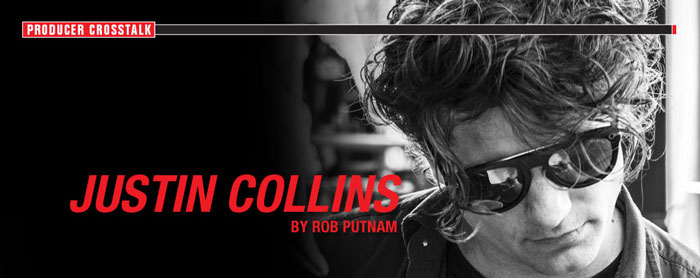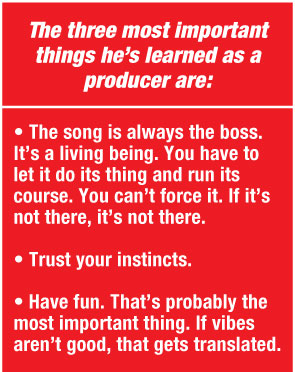
Producer, musician and songwriter Justin Collins works almost exclusively from his all-analog Nashville studio Playground Sound with partner Adam Landry. He studied audio engineering in college and got into production almost by accident when he was contacted—via Myspace—by then-rising artist Nikki Lane. She asked him to help produce her first record. Through Lane, Collins connected with Pete Molinari, signed to Partisan Records at the time. The label liked the work he and Landry turned in and gave them more projects. He’s since written/produced for bands including Deer Tick, Diamond Rugs and Middle Brother.
Collins sometimes prefers to avoid pre-production, largely because he feels that music that’s cooked for too long tends to lose flavor. “Your first natural instincts when it comes to recording are always best,” the producer asserts. “There have been times where it’s happened and in hindsight it was a good thing. But generally, I’m spontaneous, off-the-cuff in the studio. It depends on what style of album you’re making, though. Most rock & roll records need to be made spontaneously. However, Deer Tick’s new record will take about a year to complete, so that’s a case where pre-production will need to happen.”
 The song “Totally Lonely” that Collins wrote for Diamond Rugs was name-checked on NPR’s syndicated radio show Fresh Air in 2012. Loyal to his minimalist approach, it was recorded in his house on a four-track recorder. “I wrote that song thinking that maybe the guys would want to do it for their record,” he recalls. “When I played it for them, [Diamond Rugs’] John [McCauley] said, ‘What’s the point of re-recording it? We’ll just put it on as is.’ I didn’t know that it was going to be on NPR. I was driving when I heard it. But I’m not sure that being on the radio has helped my production career. Most bands I work with don’t know I wrote it, so it’s kind of a weird situation.”
The song “Totally Lonely” that Collins wrote for Diamond Rugs was name-checked on NPR’s syndicated radio show Fresh Air in 2012. Loyal to his minimalist approach, it was recorded in his house on a four-track recorder. “I wrote that song thinking that maybe the guys would want to do it for their record,” he recalls. “When I played it for them, [Diamond Rugs’] John [McCauley] said, ‘What’s the point of re-recording it? We’ll just put it on as is.’ I didn’t know that it was going to be on NPR. I was driving when I heard it. But I’m not sure that being on the radio has helped my production career. Most bands I work with don’t know I wrote it, so it’s kind of a weird situation.”
Playground Sound is an all-analog studio. Why so, in this easier age of Pro Tools where sounds can be controlled with precision down to the millisecond? “I like the sound and simplicity,” Collins explains. “We use an eight-track machine, which imposes many limitations that otherwise wouldn’t happen. It forces you to make decisions in the moment. We bus all the drums down to one track—mono drums. It keeps things raw and alive and it has the little flaws that, over time, end up being your favorite things. The less you do, the better off you’ll be and the bigger it’ll sound.”
Another reason that Collins isn’t a fan of digital recording is because it can lead to over-analysis. “I hate looking at music,” he says. “The more you look at the sound waves, the less you hear them. Computer screens in a studio drive me crazy. It causes you to dissect what you’re looking at and not what you’re hearing. People do so much cleaning when they’re looking at a song and kill it, which makes things sterile. Remember what [Neil Young producer] David Briggs used to say: ‘If you think, you stink.’”
His favorite piece of studio gear is his TEAC quarter-inch reel-to-reel tape machine. He deploys it regularly for tape delay slapback, particularly with drums. “That’s an analog effect that we call ‘babydoll,’” he explains. “I use it on almost everything.”
Collins’ EP Home, Boy dropped last September. True to form, he recorded it at his home using a four-track recorder. He aims to release the full-length album Schooly Dreams with his band Justin & The Cosmics sometime this summer. The issue will likely come by way of Cosmic Thug Records, a label that he plans to launch with Landry.
Contact Rishon Blumberg - Brick Wall Management, brickwallmgmt.com.
By Rob Putnam










